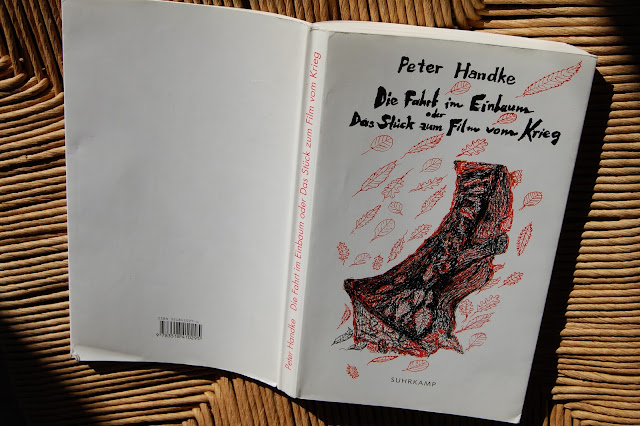Here's a snippet from the beginning of the trip:
1:30 a.m., 1 June 1998
I’m
sitting in my room in the Hotel Višegrad, looking out onto the Drina and the
Turkish bridge, still lit by floodlamps. The bridge’s eleven arches are
reflected in the silky black river. A nightingale calls from across the river.
I’ve never heard a nightingale; but it can be nothing else. Unmistakable. It
calls again, and then again. It’s indescribably romantic. I’m alone in my room.
From
the terrace below there is an occasional burst of laughter from Peter, Zlatko,
Thomas, and Žarko, who are still talking with the two women from the Organization
for Security and Cooperation in Europe, the younger one from Spain, the older
from France. We argued for hours about the role of organizations like theirs in
Yugoslavia.
How
long have you been in Yugoslavia? Peter asked the French woman.
For a year-and-a-half, she answered.
Do you speak Serbo-Croatian? Peter
asked.
No, she answered. I’ve been too busy
to learn. The first town I was in was under attack for nine months. I worked
through an interpreter.
You are here to tell the people how
to run their country and you don’t understand their language! Peter exclaimed.
You can’t bother to learn their language?
Who are you? the woman asked. What
are you doing here? What gives you the moral right to judge what I’m doing?
Go home, Peter said.
Fuck you, the woman said.
Go home.
Fuck you.
The night air had chilled, and the
French woman was shivering. Peter took his coat from the back of his chair and
draped it around her shoulders. There, he said, that will help.
Fuck you, she said, and pulled the coat around herself.
A year later the trip continued:
6 June
1999, Vienna
In
the city center, I stumble onto a Sunday-evening demonstration against NATO and
for Yugoslavia. “NATO – fascistik, NATO – fascistik!” the crowd of maybe 2000
chants.
Back in my room, unable to sleep, I
turn back to my translation of Peter’s new play. I wish Žarko were here to
compare notes. How did he translate “Fertigsatzpisse”? Pissing your finished,
your modular sentences? Sentential piss?
At 10:30 I watch a report on Peter
done for Austrian TV (ÖRF2). Peter’s crime, the reporter and his commentators
agree, is that he is a “Serbenfreund,” a friend of the Serbs. Not good to be a
friend of the enemy. Peter should have known better, it’s an old story: Jap
lover, Kraut lover, Jew lover, Nigger lover, Serb lover.
I turn off the sentential piss and
return to Peter’s play. Before midnight I’m out of paper. I write across the face of my travel itinerary. I fill margins. By one a.m., having exhausted all possibilities, I look through the cupboards and drawers in my room. The drawer of the night table opens to a Gideon Bible, in the back of which are ten blank pages. I decide the hand of God has provided and rip them out and continue translating till first light.
9 June
1999, before midnight, Žarko's birthday, Vienna
I ought to go to bed, but I'm still
reeling from the events of the day.
Several hours ago NATO and the
Yugoslav Parliament came to some kind of agreement ending the bombing after 78
days.
And, I'm just back from the world
premiere of Peter's “The Play of the Film of the War,” directed by Claus
Peymann. I’ve seldom been this moved, this challenged, by a work of art.
The really bad guys of the play,
three “Internationals” who know all the answers, who dictate all the terms, who
can think only in absolutes, appear on the stage as follows: “Three
mountainbike riders, preceded by the sound of squealing brakes, burst through
the swinging door, covered with mud clear up to their helmets. They race
through the hall, between tables and chairs, perilously close to the people
sitting there.” American and European moralists, functionaries with no hint of
self-irony or humor, absolutists who run the world because of their economic
power – these sorry excuses for human beings were depicted this evening as
mountainbike riders.
“Žarko,” I said, “Don’t you ever tell
Peter I ride a mountainbike.”
“No,
my friend,” he whispered, “I’d never do that.”
The
play drew on several incidents from our trip, including when Peter put his coat
around the shoulders of the OSCE woman in Visegrad. After the play, flushed with
enthusiasm and insight, I told Peter how well he had integrated a real event
into an imaginative play. “Brilliant to put her and her friends on
mountainbikes!”
“Doktor Scott,” he chided, “Doktor Scott. Always on
duty.”
And now, thirteen years later, after trying 20 or 25 potential publishers, one of which backed out at the last minute out of fear of what Susan Sontag might think, I've just sent off the translation to PAJ, the Performing Arts Journal published by MIT Press. It will appear in May. Makes me happy, even as I and the book have seen better days.










3 comments:
congratulations on PAJ!
see scott, you'll get rich and famous.
but susan sontag is not in the position to complain anymore, no?
i do like the picture, i have a chair like that too.
there will be no rich and famous with this play. but it sure feels good that the translation will be published!
my youngest son Tim made the stool in his shop class and gave it to me. it's especially beautiful, i think, in morning sunlight.
Post a Comment